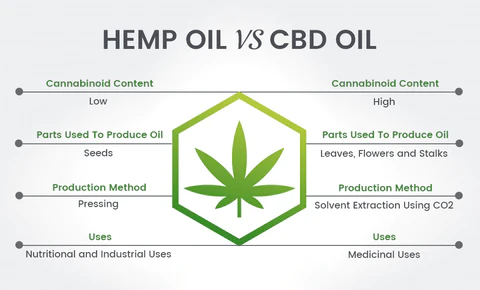
In the realm of natural remedies, CBD oil and hemp oil have emerged as two popular options, each boasting a myriad of potential health benefits. However, despite their similar origins, these two oils are distinct in composition, extraction methods, and uses. Understanding the differences between CBD oil and hemp oil is crucial for making informed choices about which product best suits your needs. Let's delve into the distinctions between CBD oil and hemp oil to shed light on their unique properties and potential benefits.
CBD Oil: Unraveling the Cannabinoid Conundrum
CBD oil, short for Cannabidiol oil, is derived from the flowers, leaves, and stalks of the hemp plant through a meticulous extraction process. Cannabidiol is one of over a hundred cannabinoids found in cannabis plants, renowned for its therapeutic properties without the psychoactive effects commonly associated with THC (tetrahydrocannabinol).
Composition: CBD oil primarily contains Cannabidiol as its active ingredient, along with trace amounts of other cannabinoids, terpenes, and essential oils. The concentration of CBD can vary depending on the extraction method and the strain of hemp used.
Health Benefits: CBD oil is celebrated for its potential to alleviate a wide range of health issues, including chronic pain, anxiety, depression, inflammation, epilepsy, and sleep disorders. Its interaction with the body's endocannabinoid system helps regulate various physiological processes, promoting overall well-being and homeostasis.
Usage: CBD oil is commonly consumed sublingually (under the tongue) for rapid absorption into the bloodstream. It's also available in various forms such as capsules, edibles, topicals, and vape products, catering to diverse preferences and needs.
Hemp Oil: Embracing the Essence of Hemp
Hemp oil, also known as hemp seed oil, is extracted from the seeds of the hemp plant through cold-pressing, a process that preserves the oil's nutrient-rich profile. Unlike CBD oil, hemp oil contains negligible amounts of cannabinoids, including CBD and THC.
Composition: Hemp oil is rich in essential fatty acids, omega-3 and omega-6, vitamins, minerals, antioxidants, and proteins. However, it lacks significant levels of cannabinoids, making it distinct from CBD oil in terms of composition and effects.
Health Benefits: Hemp oil is prized for its nutritional value and skincare benefits. Its abundance of omega fatty acids makes it an excellent dietary supplement for promoting heart health, improving brain function, and supporting overall immune function. Additionally, hemp oil's moisturizing and anti-inflammatory properties make it a popular ingredient in skincare products for hydrating and soothing the skin.
Usage: Hemp oil is commonly used in culinary applications, such as salad dressings, dips, and smoothies, to enhance flavor and nutritional content. It's also utilized in skincare products, hair care products, and as a carrier oil for diluting essential oils.
Key Differences Summarized
Source: CBD oil is extracted from the flowers, leaves, and stalks of the hemp plant, while hemp oil is derived from the seeds of the hemp plant.
Cannabinoid Content: CBD oil contains significant levels of Cannabidiol, whereas hemp oil contains negligible amounts of cannabinoids.
Composition: CBD oil primarily contains Cannabidiol, along with other cannabinoids, terpenes, and essential oils. Hemp oil is rich in essential fatty acids, vitamins, minerals, and proteins, but lacks significant cannabinoids.
Health Benefits: CBD oil is prized for its potential therapeutic effects on various health conditions, while hemp oil is valued for its nutritional benefits and skincare properties.
In conclusion, while CBD oil and hemp oil originate from the same plant, they serve different purposes and offer distinct benefits. Whether you're seeking relief from specific health concerns or aiming to enhance your overall wellness, understanding the differences between CBD oil and hemp oil empowers you to make informed decisions about which product aligns with your goals and preferences. As with any supplement, it's advisable to consult with a healthcare professional before incorporating CBD oil or hemp oil into your regimen, especially if you have underlying health conditions or are taking medication. Choose high-quality products from reputable manufacturers to ensure safety and efficacy and embark on your journey towards holistic health and vitality.
Disclaimer
The products on this site are not for use by or sale to persons under the age of 21. Furthermore, they should be used only as directed on the label, and should not be used if you are pregnant or nursing. Always consult with a physician before use if you have a serious medical condition or use prescription medications. In general, a doctor’s advice should be sought before using this and any supplemental dietary product. Finally, all the statements on this site have not been evaluated by the FDA, nor are they intended to diagnose, treat, cure or prevent any disease.

3622